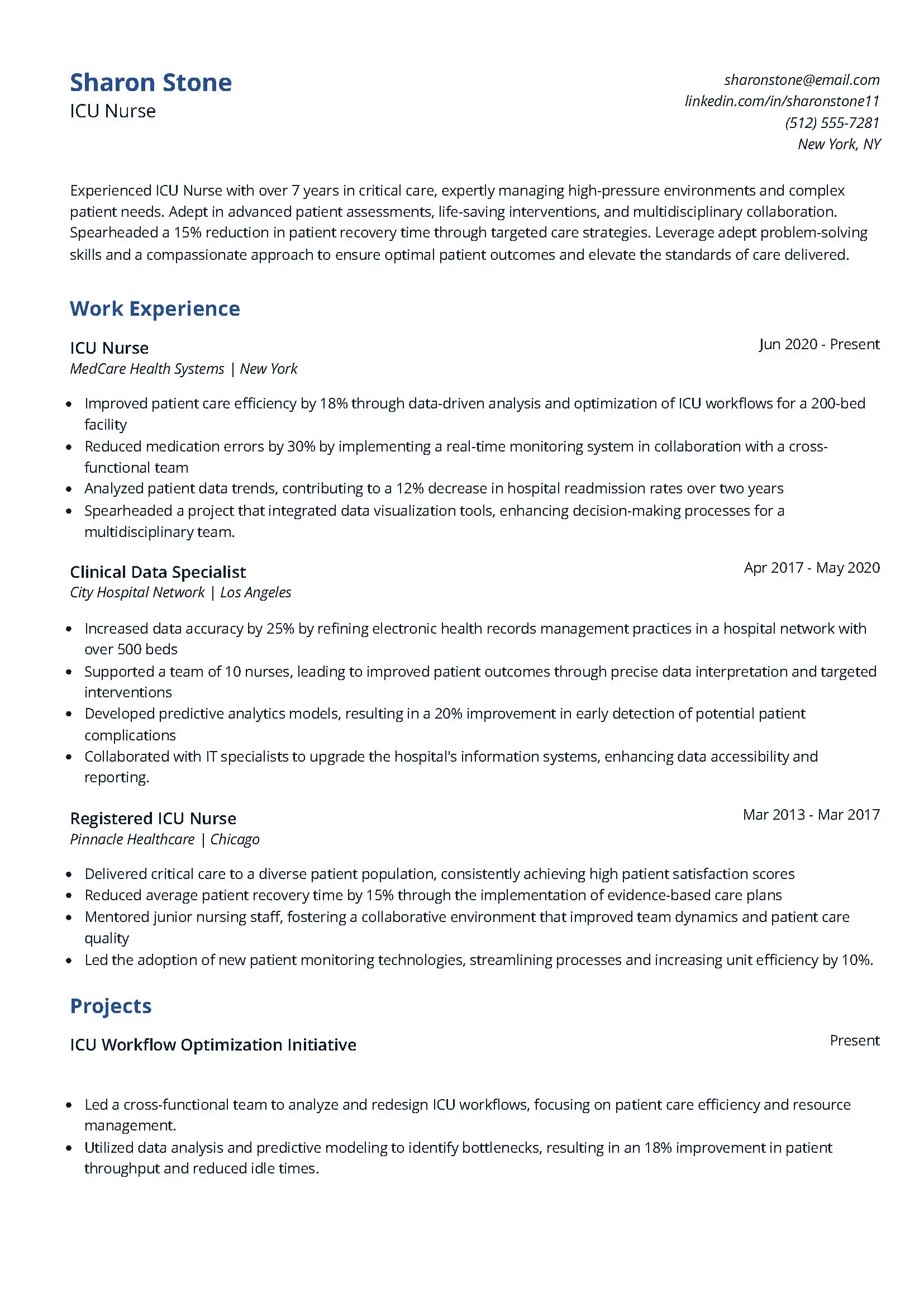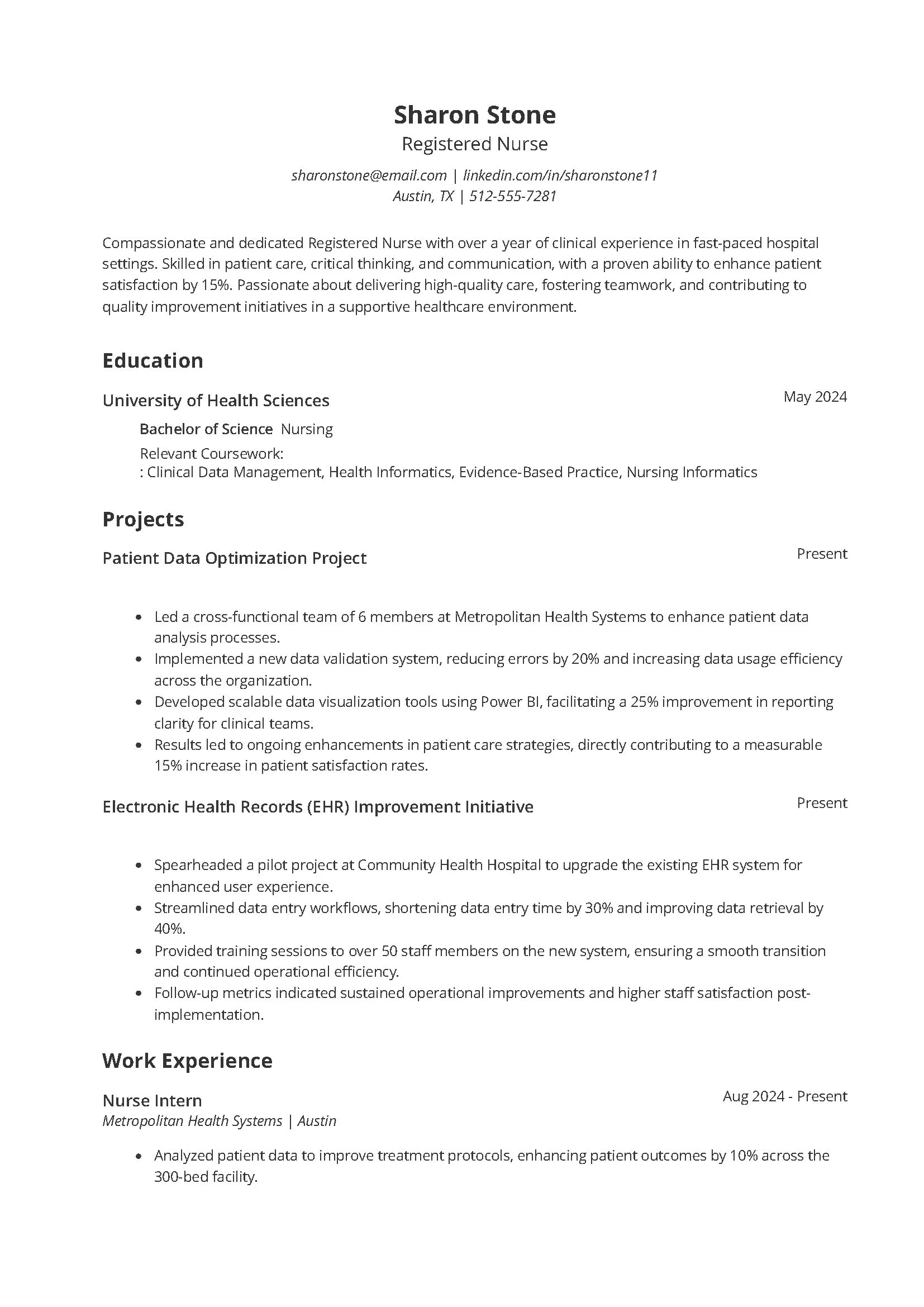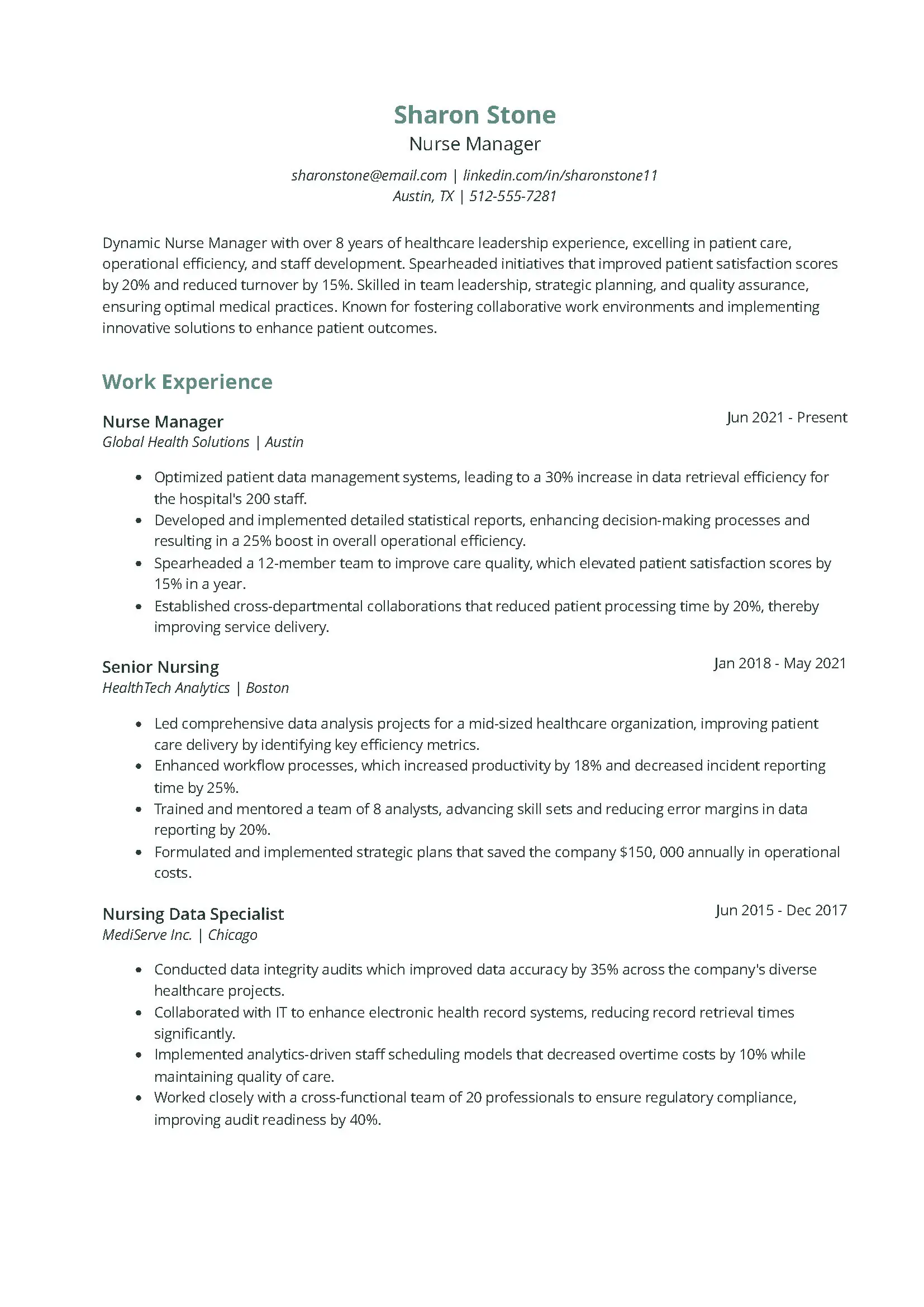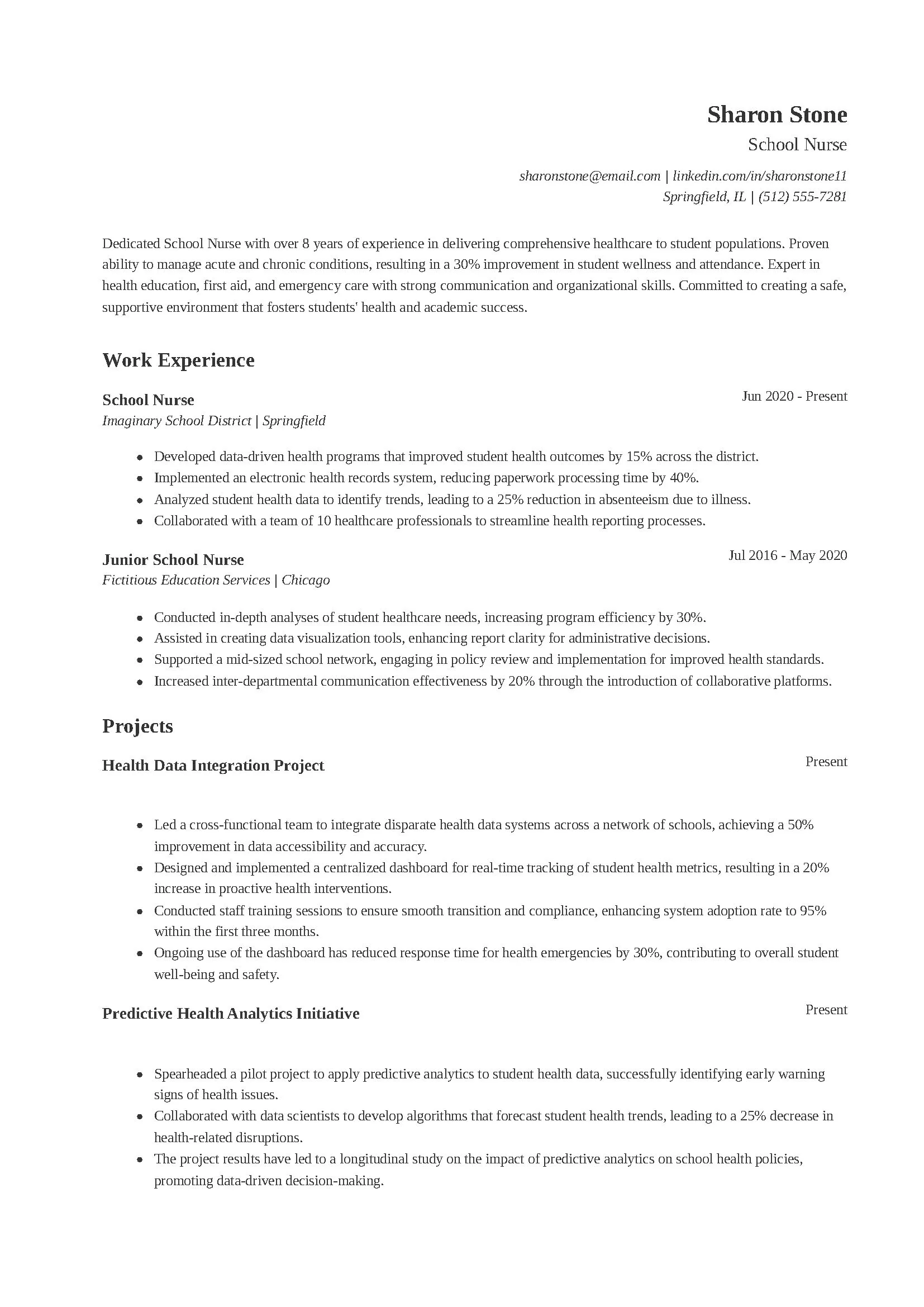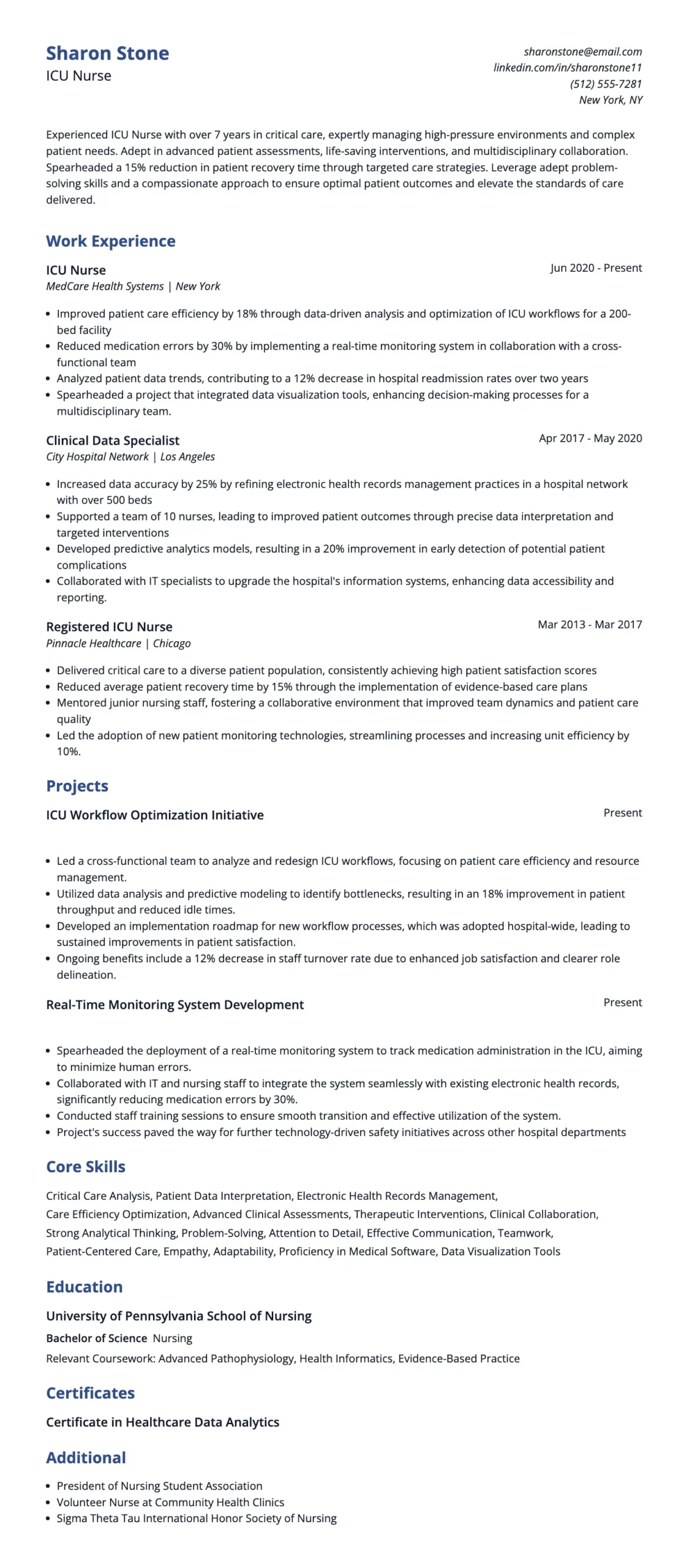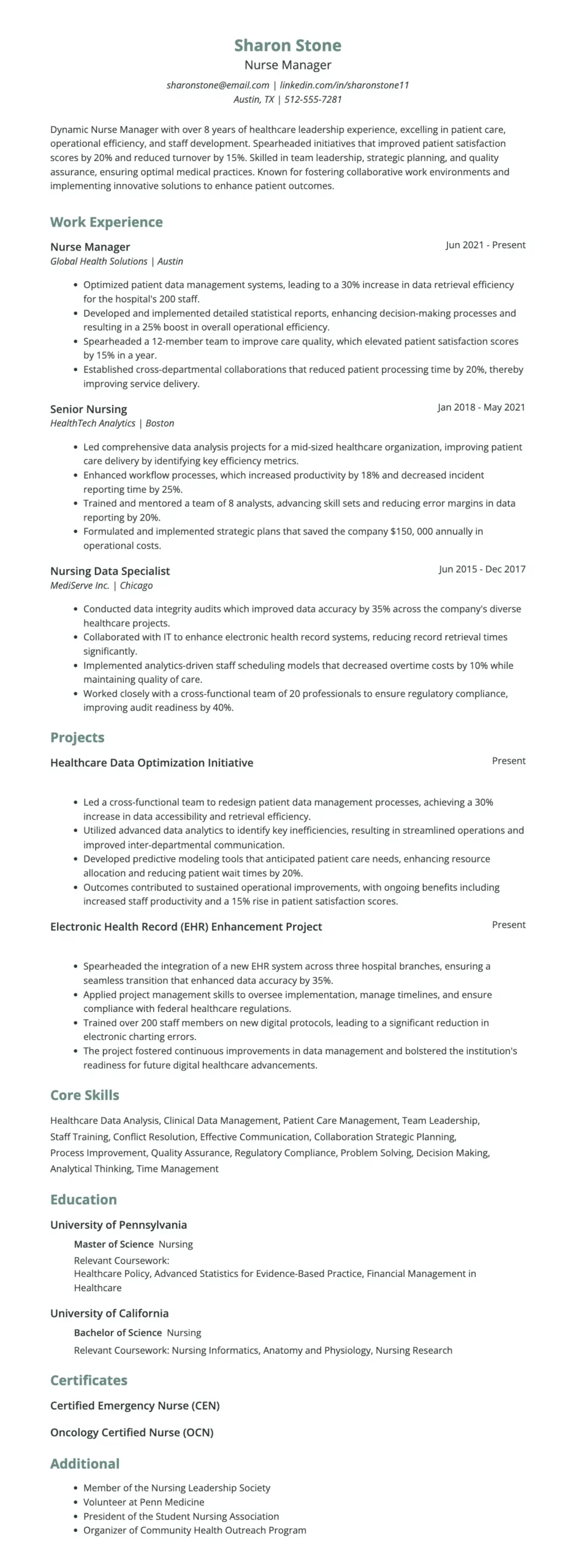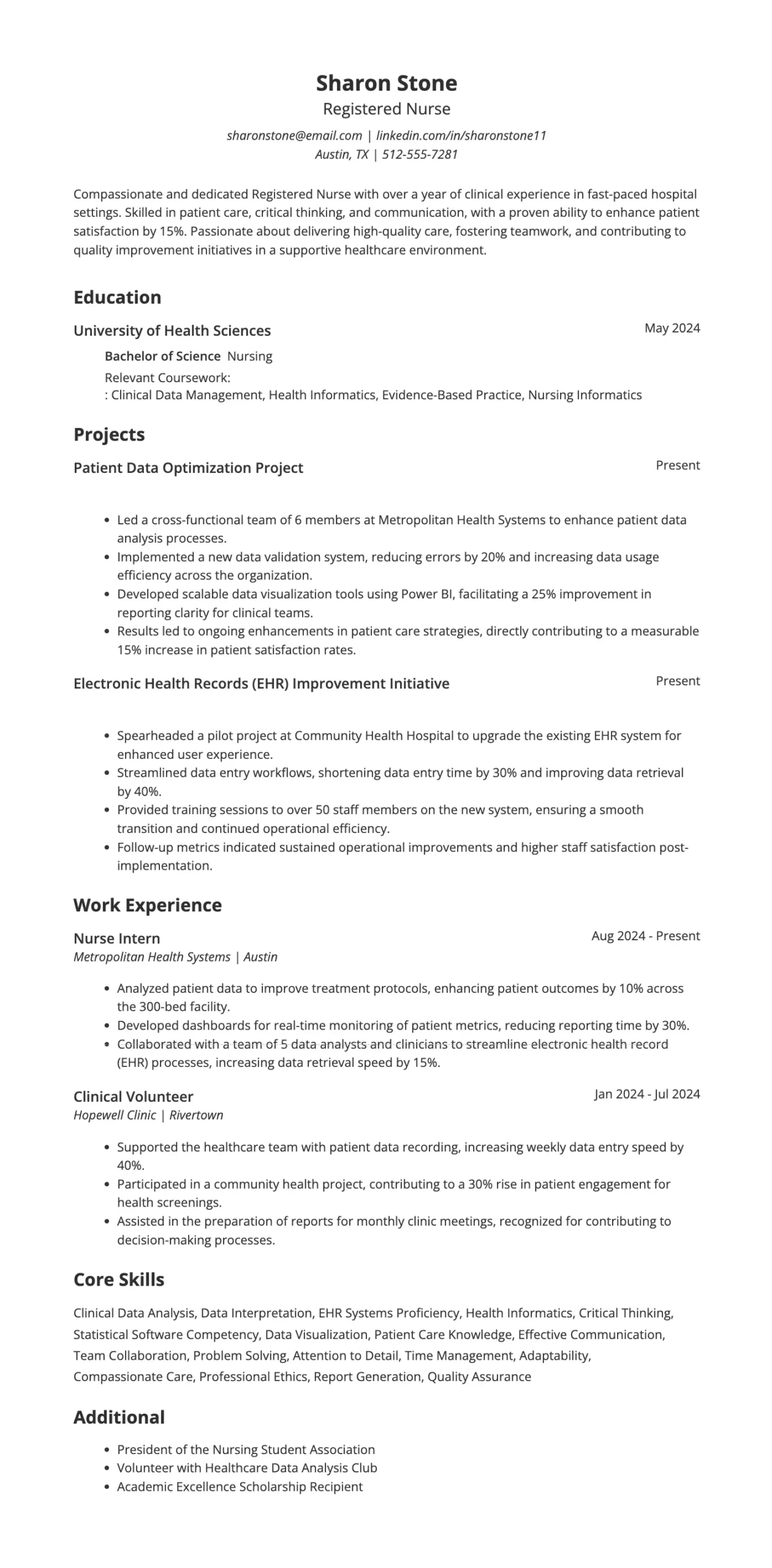Registered Nurse Resume Examples & Tips for 2025
Save time and effort writing your registered nurse resume. Our 2025 examples provide a clear roadmap to create an application that gets noticed by healthcare employers.

July 20, 2025

Registered nurses (RNs) play a crucial role in healthcare, providing essential care, support, and advocacy for patients across various medical settings. As the demand for skilled RNs grows—projected to increase by 6% through 2031—standing out with a resume in a competitive job market is vital.
However, writing a resume that highlights your expertise, experience, and passion for patient care can be a challenge. Additionally, with most healthcare employers using Applicant Tracking Systems (ATS), it’s more important than ever to create a resume that passes these automated filters.
This blog aims to guide you through the process of writing the best nursing resume for 2025, showcasing the skills and qualities employers are looking for.
ICU nurse resume example
Looking to land your next ICU nursing role? A strong resume can make all the difference. Whether you’re advancing your career or transitioning into critical care, showcasing your skills and achievements effectively is key. Below is an expert-written ICU nurse resume example to help you stand out in a competitive job market.
ICU nurses need to demonstrate clinical expertise, quick decision-making, and strong teamwork under pressure. Employers look for candidates skilled in patient assessments, life-saving interventions, and healthcare technology. Your resume should highlight measurable achievements, such as improving patient outcomes, optimizing workflows, or implementing data-driven solutions. Focus on core skills, certifications, and relevant projects to show you’re a good fit for the role.
This resume is ideal for an ICU nurse because it combines extensive critical care experience with data-driven decision-making. With over seven years in ICU settings, the candidate has optimized workflows, reduced medication errors by 30%, and improved patient recovery times by 15%. Expertise in electronic health records, real-time monitoring, and predictive analytics highlights patient safety.
Additionally, a Healthcare Data Analytics certification further strengthens their ability to improve ICU operations and patient outcomes.
School nurse resume example
Are you looking to advance your career as a school nurse? Here is a strong resume example that can help you write your resume and stand out in today’s job market.
School nurses must demonstrate clinical expertise, data analysis skills, and proactive health management. Employers seek candidates who can improve student wellness, reduce absenteeism, and implement health initiatives. Your resume should include key achievements, relevant certifications, and specialized skills like healthcare informatics and strategic planning to showcase your impact and expertise.
By showcasing exceptional academic achievements and a strong foundation in nursing informatics, public health, and healthcare policy, this resume template presents the candidate as an ideal fit. Honors such as Cum Laude and the Academic Excellence Award highlight their dedication to excellence, while leadership in nursing associations and community health initiatives demonstrates a passion for student wellness.
With both clinical expertise and data-driven decision-making skills, this resume is capable of standing out in school healthcare settings.
Nurse manager resume example
Transitioning to a nurse manager role requires a resume that demonstrates proficiency in leadership, patient care oversight, and strategic development. The following example provides a template for writing an impactful application.
Nurse managers are responsible for directing patient care, facilitating staff development, and implementing process enhancements to optimize healthcare delivery. Organizations prioritize candidates capable of guiding teams, maintaining regulatory adherence, and achieving operational excellence. Your resume should emphasize significant accomplishments, relevant certifications, and leadership experience to validate your contributions and expertise.
This nurse manager resume stands out due to its strong leadership focus, proven impact on patient care, and commitment to professional excellence. With the help of a dedicated resume summary, it highlights the candidate’s over eight years of healthcare leadership experience and key achievements such as improving patient satisfaction by 20% and reducing staff turnover by 15%.
Further, the certifications in emergency and oncology nursing reinforce expertise in specialized care. This combination of strategic management skills and clinical proficiency makes it a compelling choice for a nurse manager role.
New grad nurse resume example
Starting your nursing career? A strong resume is key to showcasing your skills in patient care, clinical data interpretation, and healthcare technology. Below is a great example to help you highlight your experience and stand out in job applications.
A new grad nurse resume should emphasize patient care expertise, teamwork, adaptability, and proficiency in healthcare technologies. Employers look for candidates with strong communication skills, problem-solving abilities, and hands-on clinical experience. Be sure to include internships, projects, and relevant coursework to demonstrate your qualifications.
This resume merges clinical nursing proficiency with data analysis capabilities, a sought-after combination in contemporary healthcare. It effectively showcases a strong foundation in clinical and analytical skills, making it ideal for entry-level nursing roles. The inclusion of key competencies like EHR proficiency, data analysis, and critical thinking highlights readiness for modern healthcare environments.
Internship and volunteer experiences demonstrate hands-on expertise, with contributions such as improving patient data retrieval by 15% and increasing clinic engagement by 30%. These experiences, paired with leadership roles, reflect adaptability and a proactive approach to patient care and healthcare innovation.
Registered nurse resume example
If you are a registered nurse looking to take your nursing career to the next level, this resume example with help you highlight your key skills and achievements to make a strong impression.
A registered nurse resume should focus on patient care experience, problem-solving abilities, and collaboration. Employers value strong communication, adaptability, and technical proficiency in health informatics and data analysis. Include measurable achievements, certifications, and relevant coursework to demonstrate your qualifications.
This registered nurse resume effectively highlights a blend of clinical expertise and data-driven healthcare solutions, making it an ideal resume example. It showcases the candidate’s progressive career growth from a Data Analyst Intern to a Registered Nurse Analyst, emphasizing interdisciplinary collaboration with healthcare teams.
The strategic use of core skills, such as data analysis, EMR systems, and predictive analytics, ensures ATS optimization. Additionally, with quantifiable achievements, including reducing readmission rates by 15% and saving $150,000 annually, this resume positions the candidate as a highly valuable candidate in the evolving healthcare landscape.
How to write a registered nurse resume that will get you an interview
With most hospitals and healthcare employers using ATS software, simply submitting a resume isn’t enough—you need one that gets past Applicant Tracking Systems (ATS). If your resume isn’t optimized for ATS, it may never reach a hiring manager, no matter how qualified you are. This means understanding how ATS works is crucial to ensuring your resume stands out.
Here’s how it works:
- Employers input important job details into the ATS.
- The ATS scans incoming resumes and stores them in the database.
- Recruiters can search for candidates through keywords within the database.
Tools like Jobscan can help improve your chances of getting noticed. The free resume builder provides ATS-friendly resumes, ensuring your resume is formatted correctly and optimized for success.
Optimize your resume
Use Jobscan's resume scanner to ensure your registered nurse resume is ATS-friendly and includes all the necessary keywords from the job description.
Scan your resume
1. Key elements of a registered nurse resume
A strong registered nurse (RN) resume should highlight your skills, experience, and qualifications in a way that is both compelling and ATS-friendly. Here are the key elements to include:
- Contact information: Ensure your full name, phone number, email address, and LinkedIn profile (if applicable) are clearly listed at the top.
- Professional summary: Write a concise, engaging summary, that highlights your experience, key skills, and career achievements. Tailor this section to align with the job description.
- Licenses & certifications: Clearly state your RN license, including the state(s) where you are registered. Also, list relevant certifications like BLS, ACLS, or PALS.
- Work/ professional experience section: Detail your previous roles, emphasizing patient care, teamwork, and specialized skills. Use bullet points and include quantifiable achievements, such as patient satisfaction scores or efficiency improvements.
- Skills section: Include both technical and soft skills, such as IV therapy, wound care, medication administration, Electronic Health Records (EHR) proficiency, teamwork, and, adaptability.
- Education section: List your nursing degree(s), the institution name, and graduation year. If you have advanced education, such as a BSN or MSN, highlight it here.
- Additional sections (optional): If applicable, include volunteer work, professional affiliations (e.g., ANA membership), or continuing education to further showcase your dedication to nursing.
2. Write a strong professional summary
Your professional summary is the first thing hiring managers and ATS scan, so it needs to quickly showcase your qualifications, experience, and key skills. A strong summary should be clear, tailored, and keyword-optimized to match the job description.
Good examples of a resume summary
- “Compassionate and detail-oriented Registered Nurse with 5+ years of experience in critical care and emergency medicine. Skilled in patient assessment, medication administration, and electronic health records (EHR). Proven ability to enhance patient outcomes and collaborate effectively with interdisciplinary teams. Certified in BLS and ACLS.”
- “Results-driven Registered Nurse with 10+ years of experience in ICU and surgical units. Certified in Advanced Cardiac Life Support (ACLS) and skilled in ventilator management, post-operative care, and trauma response. Led a nursing team that improved patient recovery times by 15% through enhanced care protocols. Committed to providing exceptional patient-centered care and staff mentorship.”
Bad examples of a resume summary
- “I am a hardworking nurse who loves helping patients. I have experience in different medical settings and work well with others. Looking for a job where I can grow.”
- “Experienced nurse familiar with patient care, medical procedures, and teamwork. I am a fast learner and passionate about healthcare.”
A well-written professional summary can set the tone for your resume and boost your chances of landing an interview—so make it count! Jobscan’s Resume Summary Generator makes it easy by analyzing job descriptions and suggesting ATS-friendly, keyword-rich summaries tailored to your target role. Try it now!
3. Demonstrate key registered nurse skills
Your skills section is a vital part of your resume, helping both ATS and hiring managers quickly identify your qualifications. A strong resume highlights a balance of hard skills (technical skills) and soft skills (personal traits).
Hard skills
- Patient Assessment & Triage
- IV Therapy & Medication Administration
- Electronic Health Records (EHR) Management
- Wound Care & Infection Control
- Emergency & Critical Care Procedures
- Monitoring Vital Signs
- Medical Equipment Operation
Soft skills
- Communication & Teamwork
- Empathy & Patient Advocacy
- Problem-Solving Under Pressure
- Adaptability in Fast-Paced Environments
- Attention to Detail & Organization
- Leadership & Mentorship
Highlighting essential nursing skills in your resume bullet points allows you to showcase your expertise and accomplishments effectively. Below, we provide examples of good and bad nursing resume bullet points to guide you. Use these examples as inspiration to create impactful bullet points that make your resume stand out.
4. Write impactful resume bullet points for registered nurse
Good examples of resume bullet points
- “Administered medications and treatments to 30+ patients daily while ensuring adherence to safety protocols.”
- “Implemented a new triage system that reduced ER wait times by 15% and improved patient flow.”
- “Trained and mentored 5 newly hired nurses, improving overall team efficiency.”
Bad examples of resume bullet points
- “Gave medicine to patients.”
- “Helped in the emergency room.”
- “Worked with other nurses.”
Struggling to write compelling resume bullet points? Jobscan’s Bullet Point Generator takes the guesswork out of the process! Simply input your role, and it will create ATS-friendly, impactful bullet points tailored to your experience. Transform basic job duties into standout achievements—try it now and make your resume shine!
5. Highlight your achievements as a registered nurse
Highlighting your achievements sets you apart by demonstrating your impact in previous roles. Instead of listing generic duties, focus on quantifiable results and specific contributions to patient care, team efficiency, or hospital operations.
Here are a few examples:
- “Provided high-quality care to an average of 20+ patients per shift, ensuring adherence to treatment plans and improving patient outcomes.”
- “Implemented evidence-based nursing practices, reducing patient recovery time by 15%.”
- “Trained and mentored 10+ new nurses, improving onboarding efficiency and reducing staff turnover.”
- “Led a quality improvement initiative that decreased hospital-acquired infections by 30%.”
- “Reduced patient wait times in a busy ER by 20% through improved triage procedures.”
- “Advocated for patient rights and safety, ensuring compliance with HIPAA and Joint Commission standards.”
6. Tailor your resume to the job description
Healthcare employers use Applicant Tracking Systems (ATS) to filter applications, and if your resume doesn’t match the job description, it may never reach a hiring manager. Tailoring your resume ensures you highlight the right skills, level of experience, and right keywords to pass ATS scans and impress recruiters.
Here’s how to tailor your resume to the job description in 5 easy steps:
- Analyze the job description.
- Incorporate keywords naturally.
- Customize your professional summary.
- Adjust your bullet points.
- Adjust job titles, if needed.
7. Include relevant education & certifications
Your education and certifications validate your qualifications and demonstrate your commitment to professional excellence. Many healthcare employers require specific degrees and licenses, and Applicant Tracking Systems (ATS) often scan for these credentials.
Listing your education and relevant certifications ensures you meet job requirements and stand out from other candidates. Additionally, showcasing advanced certifications can set you apart by highlighting specialized expertise.
Follow the tips below to do it effectively:
- Create a dedicated section and label it “Education & Certifications” or separate them as “Education” and “Certifications” if you have multiple credentials.
- List your nursing education properly. Include your degree, school name, and graduation year.
- If you are still in school, mention your expected graduation date.
- Avoid listing expired or irrelevant certifications that don’t apply to nursing.
Top registered nurse certifications
Below are some top registered nurse certifications that can be added to your resume:
- Basic Life Support (BLS)
- Advanced Cardiovascular Life Support (ACLS)
- Pediatric Advanced Life Support (PALS)
- Certified Critical Care Nurse (CCRN)
- Certified Emergency Nurse (CEN)
- Oncology Certified Nurse (OCN)
Registered nurse resume tips
Follow these best practices to make your application stand out:
- Stick to a simple, ATS-compatible layout (avoid fancy fonts, images, or tables).
- Use clear section headings and bullet points for easy readability.
- Always list your RN license and additional certifications like BLS, ACLS, or CCRN
- Customize your summary, skills, and experience to match each job posting.
- Use these keywords naturally throughout your resume.
Include a cover letter with your registered nurse resume
Do you think your resume alone is enough? Think again! Many hiring managers expect a cover letter, and skipping it could mean missing out on opportunities—especially in competitive nursing roles.
A well-written cover letter helps you:
- Personalize your application and show genuine interest in the role
- Highlight relevant experiences that make you the perfect fit
- Explain employment gaps or career transitions
- Stand out from other candidates by adding a human touch
But writing a compelling cover letter can feel overwhelming—where do you start? Jobscan’s Cover Letter Generator makes it easy! Just enter your details, and it writes a customized, ATS-friendly letter tailored to the job description.
Final thoughts
In a healthcare landscape that’s constantly evolving, your RN resume is your first and most vital opportunity to showcase your dedication and expertise. By choosing the right format, optimizing for ATS, showcasing key skills and achievements, and tailoring your resume to each job, you can stand out in the competitive nursing field.
Need help fine-tuning your resume? Jobscan’s powerful features make the process easy by ensuring your application is optimized for hiring systems and recruiters. Take the next step in your nursing career—build your standout resume today!

Registered nurse common interview questions
“In the ER, I once managed multiple critical patients simultaneously during a mass casualty situation. I prioritized care using the triage system, delegated tasks efficiently, and remained calm under pressure. My ability to focus and act quickly helped stabilize patients and ensure smooth team coordination.”
“I follow strict infection control protocols, double-check medication dosages, and actively communicate with my team. I also educate patients on post-care instructions to reduce readmissions and promote recovery.”
“I once cared for an elderly patient who refused medication. Instead of forcing compliance, I took time to understand their concerns, educated them on the treatment benefits, and involved their family. By building trust, I encouraged adherence to their care plan.”
“I bring a combination of clinical expertise, patient-centered care, and teamwork. My ability to stay calm under pressure, adapt to new challenges, and consistently improve patient outcomes makes me a valuable addition to your healthcare team.”
Registered nurse resume frequently asked questions
Highlight clinical skills like patient care, IV therapy, and EHR proficiency, along with soft skills like communication, teamwork, and adaptability. Tailor your skills to the job description for ATS optimization.
Include your education in a dedicated “Education” section, listing your degree, school name, and graduation year. If still in school, mention your expected graduation date. Highlight relevant coursework if applicable, and ensure certifications like RN license, BLS, or ACLS are clearly listed.
Use a functional format to emphasize skills, training, and clinical rotations. Highlight internships, volunteer work, or relevant coursework, and include certifications to show your readiness for the role.
